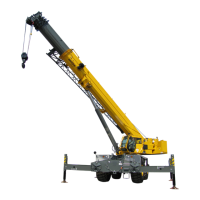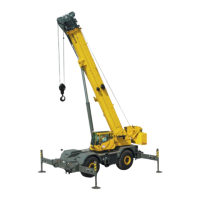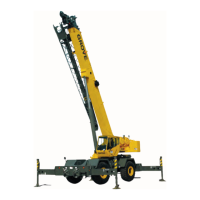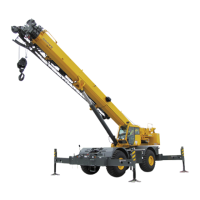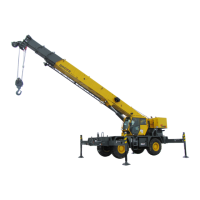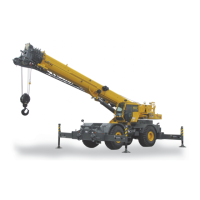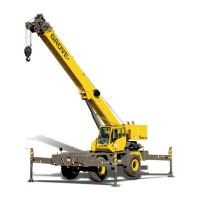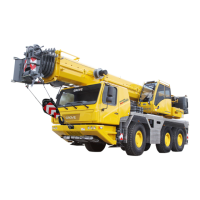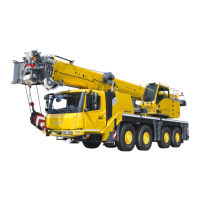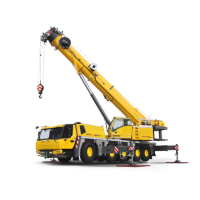Do you have a question about the Manitowoc Grove RT9150E and is the answer not in the manual?
General info about the manual, overview, delivery report, customer support, and crane description.
Detailed crane specifications including dimensions, capacities, engine, axles, brakes, and hydraulic systems.
Comprehensive guide on wire rope inspection, lubrication, installation, and safety precautions.
Importance of safety messages, general principles, operator responsibilities, and accident procedures.
Requirements for qualified operators and description of operational aids like RCL and A2B systems.
Factors affecting crane stability, load charts, work site, and wind considerations.
Methods to determine wind speed and its impact on load capacities, including calculations.
Detailed procedures for safe lifting and standard hand signals for communication.
Procedures for jib installation, parking, securing, and operating in cold weather.
Guidelines for pile driving, crane inspection, and electrocution hazards.
Electrical contact procedures, hazard devices limitations, and special operating conditions.
Safety requirements for hoisting personnel and proper waste disposal methods.
General maintenance, service, and safety for batteries, engine, and hoist rope.
Procedures for safely transporting and traveling the crane.
Personal considerations, crane access, and job preparation steps.
General working procedures and associated hazards.
Temperature effects, inspection procedures, and specific hazards.
Overload inspection and boom inspection procedures.
Inspection guidelines for the superstructure and carrier components.
Description of operational aids like RCL, A2B, and control lever lockout systems.
Controls on the steering column, floor, pedals, and cab features.
Controls on the right side console, ECOS panel, and armrest assemblies.
Explanation of ECOS display menus like Working Range, Monitoring, Power Unit Speed, and Settings.
Procedures for entering and confirming rigging mode, counterweight, and load charts.
Detailed procedures for manual and teleautomation telescoping, luffing jib, and boom extensions.
Controls and indicators for outrigger deployment and swing gear operations.
Explanation of error codes, messages, and troubleshooting procedures.
General setup, accessing hoist area, travel and working configurations.
Steps for removing old hoist cable and installing a new one, including cable reeving.
Procedures for installing wedge socket assemblies and wire rope clips.
Detailed procedures for installing and removing standard and heavy counterweights.
Procedures for removing and installing outrigger boxes and pins.
Instructions for installing and removing A2B switches on boom extensions.
Information on available boom extensions and their serial numbers.
Step-by-step instructions for erecting folding boom extensions.
Connecting hydraulic and electrical circuits for boom extensions.
Procedures for positioning and removing the hoist cable on boom extensions.
Installation and removal of the auxiliary boom nose.
Details on the heavy duty luffing boom extension components.
Procedures for mounting and removing the anemometer and warning light.
General guidelines for lubrication, environmental protection, and waste disposal.
Service intervals and recommended standard lubricants for normal conditions.
Recommended lubricants and precautions for arctic conditions and low temperatures.
Recommendations for protecting exposed cylinder rods from corrosion.
Importance and procedures for lubricating wire rope.
Detailed list of lubrication points, including oil levels and grease fittings.
Lubrication schedule and approved lubricants for steering and suspension components.
Lubrication requirements for engine, transmission, torque converter, and filters.
Lubrication schedule for outrigger beams, jack cylinders, and support tubes.
Procedures for checking and maintaining hydraulic oil and filters.
Lubrication points for turntable gear, drive pinion, bearing, and slew angle sensor.
Lubrication for cab tilt cylinder pivot pins and bearings.
Lubrication point for the lower lift cylinder pivot pin.
Lubrication for hoist drum and boom pivot bearing.
Procedures for lubricating boom telescope sections and sheaves.
Introduction to daily and weekly inspection checks for safety and productivity.
List of daily checks for air cleaner, A2B, brakes, cooling system, fuel, and more.
List of weekly checks for sheaves, tires, transmission, and wire rope.
| Model | RT9150E |
|---|---|
| Type | Rough Terrain Crane |
| Engine | Cummins QSL 9 |
| Number of Axles | 2 |
| Drive/Steer | 4x4x4 |
| Overall Width | 11.5 ft (3.5 m) |
| Maximum Lift Capacity | 150 US tons (136 metric tons) |
| Drive Configuration | All-wheel drive |
| Overall Height | 12.8 ft (3.9 m) |
| Operating Weight | 120, 000 lbs |
